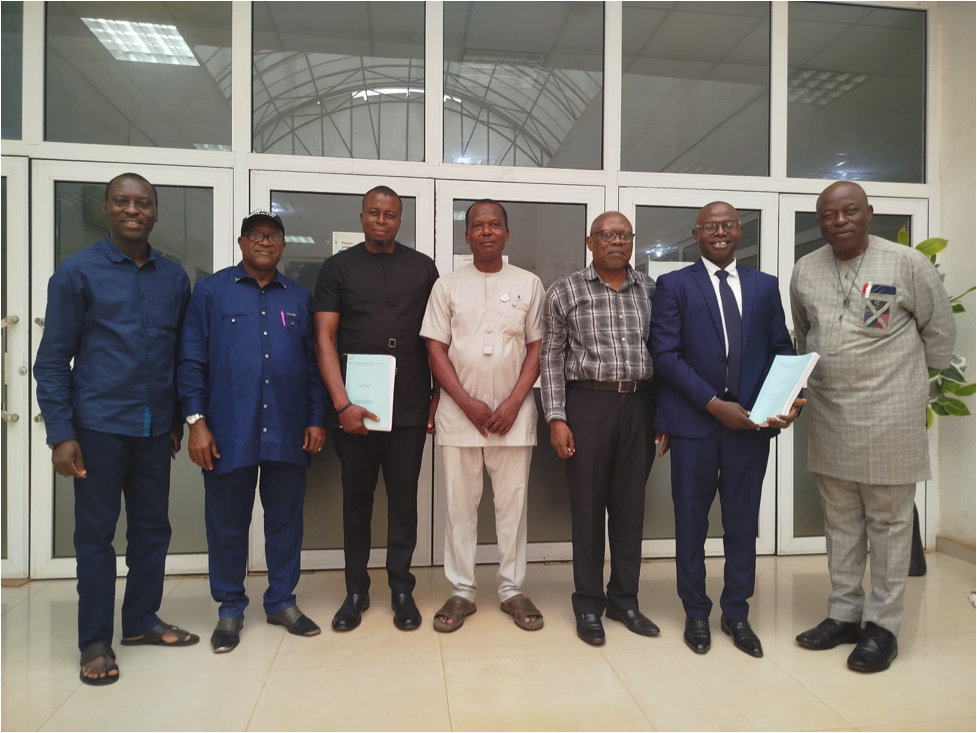Ngozi Louis Uzomah’s Thesis Illuminates the Complex Realities of Return Migration for Cameroonian Refugees
Group photo of panel members. Second from the right is Ngozi Louis Uzomah, and next to him, third from the right, is his project supervisor and GAPs team member, Prof. Ignatius I. Madu. Source: Dr. Ngozi Louis Uzomah (2024).
We are delighted to celebrate the success of our GAPs team member, Ngozi Louis Uzomah from the University of Nigeria Nsukka, who has achieved a remarkable milestone. On October 24, 2024, Ngozi defended his PhD research on the aspirations and challenges facing Cameroonian refugees in Nigeria. His work, deeply relevant to the EU-funded GAPs project, sheds light on the complexities of return migration in an often-precarious context.
Ngozi's dissertation unpacks the delicate balancing act faced by refugees in Nigeria, who must make tough choices between returning home amid ongoing conflict in their country and living in Nigeria. His research provides a nuanced understanding of why, despite relative calm in some parts of Cameroon, many refugees still chose to remain in Nigeria. This is because the general condition in Cameroon contributes more to refugee return decision-making than the condition in Nigeria. Specifically, refugees who will face fewer legal and physical safety concerns in Cameroon appear to be the most likely to return home. This compelling analysis not only enriches migration studies but also aligns seamlessly with GAPs’ mission to deepen our grasp of return migration’s challenges.
A standout feature of Ngozi’s work is his categorisation of refugee mobility outcomes based on their return aspirations and ability to return: Returning, Involuntary Immobile, Voluntary Immobile, Onward Immobile, and Revolving refugees. This framework reveals a spectrum of aspirations and experiences, which is essential for GAPs' goal of decentering simplistic narratives in return policymaking. By acknowledging the diverse perspectives and motivations that drive—or hinder—return, Ngozi’s findings call for a more inclusive approach to return policies, an objective central to the GAPs project.
Ngozi’s research also underscores a key GAPs focus: the critical disconnect between refugees' aspirations to return and their ability to do so which hinges on the stark realities of the financial cost of returning home and the dynamics of conflict in Cameroon. Many refugees wish to return, yet they are constrained by factors beyond their control which may lead some to migrate to a third country, a situation that resonates with GAPs’ observations on EU return policies, especially in relation to Dublin return. This disconnect speaks to the need for more harmonised and responsive approaches, urging policymakers to bridge the gap between policy intentions and the actual lived experiences of migrants.
Importantly, Ngozi’s work highlights refugee agency, showcasing how some refugees engage in "split migration," where family members alternate between staying in Nigeria and testing the waters in Cameroon. This strategic decision-making reflects migrants’ resilience and autonomy, essential elements for GAPs as it advocates for policy frameworks that honor and support migrants’ choices.
Ngozi’s findings are not only a scholarly achievement but also a beacon of hope. As a Europe-based returnee himself, his success speaks to other returnees and deportees who face similar uphill journeys. We applaud Ngozi for his invaluable contributions to migration studies and to the GAPs project, which aspires to reshape return migration policies to support safe, dignified, and sustainable outcomes for refugees worldwide.

